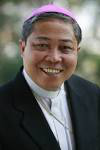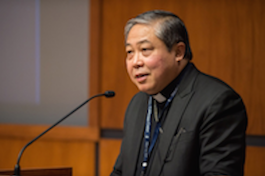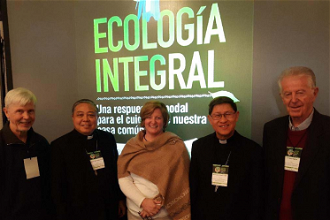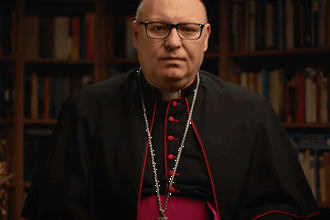Holy See calls international community to protect children in war zones

Archbishop Auza
The Holy See has urged the International community to "intervene" when national governments are unable or unwilling to protect their populations. Archbishop Bernardito Auza, Permanent Observer of the Holy See to the United Nations, was speaking at an open debate on "Children in Armed Conflict" at the United Nations Security Council.
"In the case of non-State actors forcibly recruiting and using child soldiers around the world or committing brutal violence against religious and ethnic minorities, when a State is unwilling or unable to confront such atrocities, it is the responsibility of this body to provide, when all other tools and means are exhausted, military means necessary to protect citizens from such inhumane aggressors," he said.
Archbishop Auza cautioned that solutions to children in armed conflict cannot be limited to the use of force alone. "Rather the first step requires a renewed commitment to addressing the humanitarian, social, political and economic situations that drive conflicts in which child soldiers are used.. In this regard, faith-based communities can play a vital role in serving the communities impacted, reintegrating former child soldiers and providing a means for dialogue," he said.
The Archbishop said a solution to the plight of child soldiers also requires sensitivity to finding ways to reintegrate these children back into their own communities.
"While we witness barbaric acts beyond anyone's imaginations also committed by child soldiers, we must remember that these children are exploited and manipulated into what they have become... Thus, while their reintegration into society requires that we recognize that they have committed atrocities, we must at the same time build pathways for counseling and reconciliation with a view to accomplishing fully that reintegration."
The full text of Archbishop Auza's intervention follows:
Intervention of HE Archbishop Bernardito Auza, Apostolic Nuncio and Permanent Observer of the Holy See to the UN United Nations Security Council Open Debate on 'Children in Armed Conflict' New York, 25 March 2015
Mr. President, At the outset, I would like to congratulate you for your Presidency during this month and for scheduling this Open Debate on children in armed conflict.
Today's debate comes at a time when the international consensus of the evils of using children as soldiers in armed conflicts is not only morally condemned but also being more vigorously challenged on the ground by various actors around the globe. The increasing use by terrorist groups and other non-state actors of children in armed conflicts demonstrates the urgent need for a new international consensus to confront this crime and to renew the will of the International Community to address this scourge.
The year 2014 marked the worst year in the modern era of children being used as soldiers in armed conflicts. In Syria and Iraq alone, we have seen more than 10,000 children forced and coerced into becoming child soldiers. While the world searches for solutions, we must all take the first step and uniformly affirm that the recruitment and use of children in armed conflicts is not only a grave violation of international humanitarian and human rights law but is an abominable evil to be condemned. This affirmation must not be done by governments alone, but by all social, political and religious leaders.
Mr President, The rising influence of non-State actors in regions across the globe has presented this Council and the global community with a growing challenge which requires new tools and new efforts to confront. It is for this reason that the founders of the United Nations gave to this Council the "responsibility for the maintenance of international peace and security."
This primordial mission does not and must not allow the International Community to turn its back on conflicts in the name of national political interests or geopolitical disagreements with other countries. This responsibility is entrusted to this Council by all the Members of the United Nations, so that the foundational notion of governance is preserved and the responsibility to protect is upheld. This responsibility not only requires national governments to protect their citizens, but also urges the International Community to intervene when national governments are unable or unwilling to protect their populations.
In the case of non-State actors forcibly recruiting and using child soldiers around the world or committing brutal violence against religious and ethnic minorities, when a State is unwilling or unable to confront such atrocities, it is the responsibility of this body to provide, when all other tools and means are exhausted, military means necessary to protect citizens from such inhumane aggressors. However, solutions to children in armed conflict cannot be limited to the use of force alone. Rather the first step requires a renewed commitment to addressing the humanitarian, social, political and economic situations that drive conflicts in which child soldiers are used. In this regard, faith-based communities can play a vital role in serving the communities impacted, reintegrating former child soldiers and providing a means for dialogue. Faith-based communities also have a responsibility to ensure that those organizations which seek to justify the use of child soldiers in the pursuit of ideological goals driven by distorted understandings of faith and reason are rightly condemned and denounced.
While the International Community plays an important role in supporting States in their primary responsibility to protect their citizens, it must also be sure to interact with the local community so that solutions to child soldiers and conflicts can also emerge organically and local ownership be fostered. Building peace requires the willingness to dialogue even when conflict has sown hate and distrust.
A solution to the plight of child soldiers also requires sensitivity to finding ways to reintegrate these children back into their own communities. While we witness barbaric acts beyond anyone's imaginations also committed by child soldiers, we must remember that these children are exploited and manipulated into what they have become.
Thus, while their reintegration into society requires that we recognize that they have committed atrocities, we must at the same time build pathways for counseling and reconciliation with a view to accomplishing fully that reintegration.
Mr President, The International Community already has many of the tools necessary to confront the use of child soldiers. However, it lacks the political will and moral courage to take the steps needed to address the challenge.
As children are abducted from their schools to be enslaved, as children are forced to become suicide bombers and as children are drugged and tortured into becoming child soldiers, what will it take before we no longer avert our eyes? Thank you, Mr President.


















